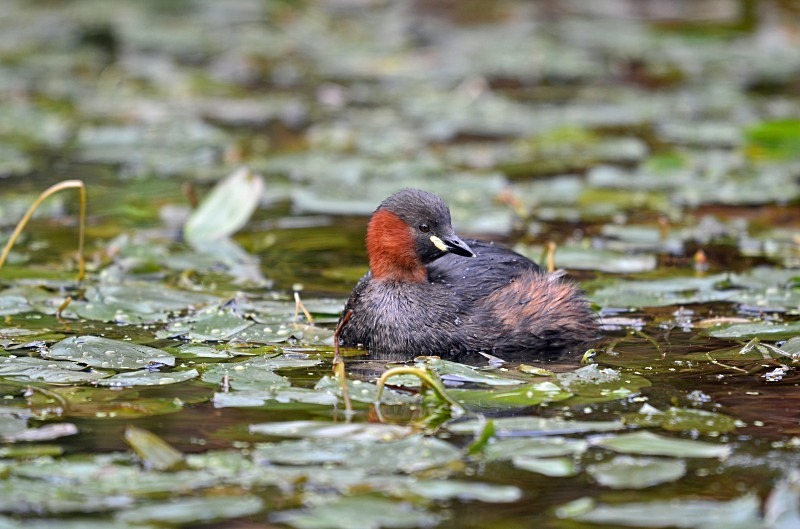Little Grebe

The Little Grebe, also known as the Dabchick, is the smallest member of the grebe family measuring 9 to 11.5 inches in length. The adult is unmistakable in summer, predominantly dark above with its rich, rufous colour neck, cheeks and flanks and bright yellow gape. The rufous is replaced by a dirty brownish grey in non-breeding and juvenile birds. Juveniles have a yellow bill with a small black tip and black and white streaks on the cheeks and sides of the neck. This yellow bill darkens as the juveniles age, eventually turning black as an adult.
The Little Grebe can be noisy with a distinctive whinnying trill.
The Little Grebe can be found across Europe, much of Asia down to New Guinea and in most of Africa. It breeds in small colonies in freshwater wetlands with muddy bottoms and edges and still or slow-moving water with plenty of emergent vegetation such as lakes, gravel pits, canals and rivers. Most birds move to more open or coastal waters in winter but it is only migratory in those parts of its range where the waters freeze.
Like all grebes, the Little Grebe nests at the water's edge since its legs are set very far back and it can not walk well. Usually 4 to 7 eggs are laid. The young leave the nest and can swim soon after hatching but are often carried on the backs of the swimming adults.
The Little Grebe is an excellent swimmer and diver and pursues its fish and aquatic invertebrate prey underwater. It uses the vegetation skilfully as a hiding place.
Date: 18th September 2011
Location: Cromford Canal, Derbyshire
The Little Grebe can be noisy with a distinctive whinnying trill.
The Little Grebe can be found across Europe, much of Asia down to New Guinea and in most of Africa. It breeds in small colonies in freshwater wetlands with muddy bottoms and edges and still or slow-moving water with plenty of emergent vegetation such as lakes, gravel pits, canals and rivers. Most birds move to more open or coastal waters in winter but it is only migratory in those parts of its range where the waters freeze.
Like all grebes, the Little Grebe nests at the water's edge since its legs are set very far back and it can not walk well. Usually 4 to 7 eggs are laid. The young leave the nest and can swim soon after hatching but are often carried on the backs of the swimming adults.
The Little Grebe is an excellent swimmer and diver and pursues its fish and aquatic invertebrate prey underwater. It uses the vegetation skilfully as a hiding place.
Date: 18th September 2011
Location: Cromford Canal, Derbyshire

|















